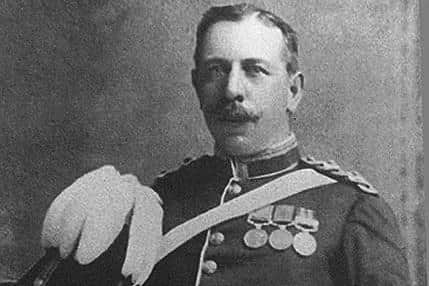The Balcombe war hero who fought in the battle of Rorke’s Drift: Mid Sussex resident shares true story behind Zulu film
and live on Freeview channel 276
And one of its gallant survivors portrayed in the film was a soldier raised on a farm in Balcombe, Lt Col Frank Edward Bourne, born in 1855.
Bourne, who died in 1945, was one of eight children of farmer James Bourne and his wife Harriet Gaston.
Advertisement
Hide AdAdvertisement
Hide AdJobs were scarce and usually dull so, seeking excitement, Bourne joined up in 1872. Seven years later he got a good deal more excitement than he imagined, in what we now know as South Africa.


Most of his 24th (2nd Warwickshire) regiment had been wiped out by Zulus after a catastrophic battle of Isandlwana in 1879. The triumphant Zulus then moved on to attack the small company left at lonely Rorke’s Drift, outnumbering the British and some native troops by 40 to one. The Zulus numbered thousands and the 24th had just over 100 at the height of battle on 22 and 23 January 1879.
The few held out, helped by disciplined rifle fire and despite repeated attacks, until re-enforcements arrived. The soldiers had to rip off their jackets to help them hold their red-hot rifles because they had shot so many bullets. Bourne described the battle in a radio interview in 1936 and a transcript survived.
At 23 Bourne found himself in charge of a company of about 100 men in the most terrifying of circumstances. Promoted to colour-sergeant, he was the youngest non-commissioned officer in the British Army, and was known jokingly as ‘The Kid’.
Advertisement
Hide AdAdvertisement
Hide AdAt Rorke’s Drift they knew nothing of the Isandlwana slaughter, until survivors staggered into Rorke’s drift and told them of the advancing Zulus. Bourne was shaken when he discussed this with a veteran who said: “Not a fighting chance for you, young fellah.”
Bourne said the Zulus could have wiped out the soldiers with a more cunning and fewer frontal-attacks, by ripping apart bags of corn and oats used as barricades. He said: “He (The Zulu) could safely have crept along, cut the sacks open, the corn would have rolled out, he could have walked in.”
Initially the British had 300 men, but about 200 deserted before battle.
In a scene captured in the film the attackers set fire to the hospital and murdered the patients, with a few men winning Victoria Crosses for trying to defend them.
Advertisement
Hide AdAdvertisement
Hide AdBourne reported that most of the British were killed by guns captured by the Zulus, saying: “There was hardly a man even wounded by an assegai (spear), their principal weapon.”
The hand-to-hand battle lasted 12 hours and at 7am next day the Zulus massed again. But Lord Chelmsford, whose blunder had led to the Isandlwana disaster, arrived with a relief army and the Zulus scattered.
Only 17 of the defenders died and about 400 Zulus were killed.
To the disappointment of many troops, Bourne never received the VC, although he did receive a Distinguished Conduct Medal for his ‘outstanding coolness and courage’.
Advertisement
Hide AdAdvertisement
Hide AdIn the film Bourne is played by Nigel Green. Bourne had a successful Army career and died in Beckenham aged 90. A plaque on his old house in Kent bears testimony to one of the bravest men to venture out of Mid Sussex.